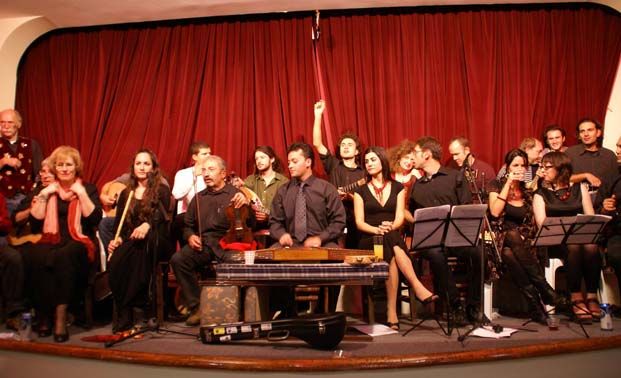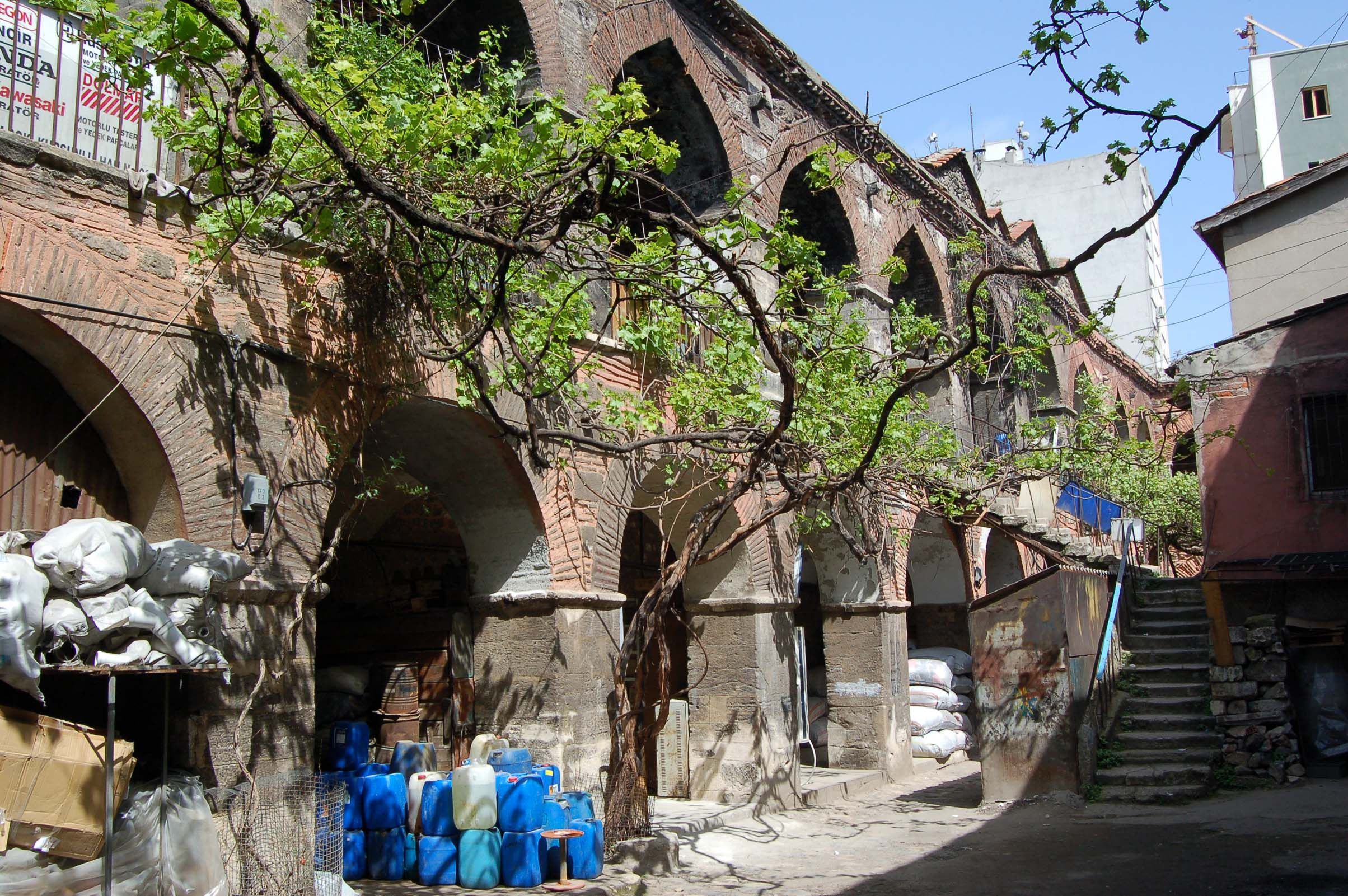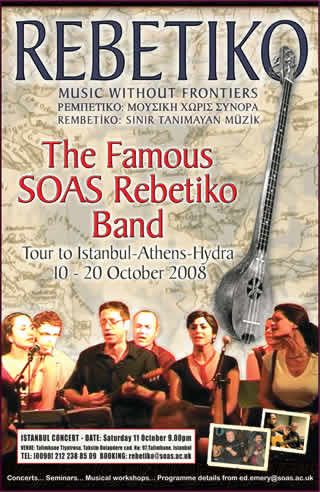
Rebetiko – Music
without Borders

Rebetiko – Music
without Borders
Famous SOAS
Rebetiko Band – 10-13 October 2008
The “Famous SOAS Rebetiko Band” was formed out of seminars organised by musicologist Ed Emery at the School of Oriental and African Studies [SOAS] in London. The initiative arose out of the activities of the London-based Institute of Rebetology, an international network of researchers and musicians concerned with the study of rebetiko.
Rebetiko is a
broad Greek genre of urban urban songs and instrumental music which developed in and around the
major port areas of the Eastern Mediterranean – Smyrna/Izmir, Istanbul, Syros,
Piraeus and Thessaloniki. Although distinctive it is hard to define as a genre,
not least because it incorporates elements from all the musical cultures of
that area.
Music has been a matter of censorship in
both Greece and Turkey and it is still a battlefield for contending
nationalisms. Rebetiko in particular was banned in Greece in the 1930s, and was
seen as decadent in Turkey. Our band is a mixed ensemble of Greeks, Turks,
Cypriots, British and other nationalities, as well as hyphenated identities
in-between. For us, music is promiscuous, prolific and flows where it will.
Music is a matter of the heart. Music has no frontiers. And that is our chosen
title for this tour.

The Famous SOAS
Rebetiko Band: Ertho Theatre, Istanbul, 12.x.08 [Photo: David Paskett]
Reasoning that the best way to
study the music is to play it, we decided to extend the seminars into hands-on
music-making. We created an informal musical group which met monthly for
rehearsals, and which also played small concerts. From the start we encouraged
Turkish musicians to join our group, and almost immediately we discovered that
many of our Greek songs existed also in Turkish versions. It is hard to express
the exhilaration of recognition that this sparked in the band – the recognition
of a shared culture between Greeks and Turks which the nationalisms in both
countries tend to obliterate.
Having played concerts for
Turkish audiences in North London we realised that there is a tremendous
enthusiasm among Turks for Greek rebetiko music. It was for that reason that we
resolved to take the band on a tour to Turkey in 2008. In April 2008 Ed Emery
travelled to Istanbul to identify suitable venues and prepare publicity
networks for a series of concerts and seminars. We decided to play two formal
concerts and three informal jam sessions in which local musicians would be
invited to participate.
The make-up of the band
includes Greek, Cypriot, Turk and British musicians and singers, together with
mixed Greco-British and other nationalities (notably our Iranian santur
player). The instrumentation includes bouzouki, baglama, tzoura, violin, guitar,
cello, santur and percussion, a range which enables us to reproduce various of the historical repertoires of rebetiko. Importantly, our lead singers include native
Greeks and native Turks, and in a deliberate and unusual choice we make a point
of singing some of our songs in both Greek and Turkish versions.
For the Greek musicians the
presence of our Turkish and Iranian colleagues has been fundamental in
developing an understanding of the maqam system of musical scales on
which much of Greek rebetiko is based.
Our Istanbul tour had various
purposes:
(a )
to create a musical bridge between
(b) to
explore the historical connections between modern Greeks musical culture and
the musical cultures of Istanbul/Constantinople in the Ottoman and post-Ottoman
period;
(c) to
create a possibility of bringing Greek musicians to
(d) importantly
for us, to play a concert for an endangered species of humanity, the historical
Greek community of
To that end we organised to
play two major concerts – one at the newly opened Talimhane Theatre near
Taksim, for a Turkish audience, and one at the Ertho Theatre at Feriköy, for
the Greek community.
Newspaper articles about the
tour:
Le Monde
diplomatique:
http://mondediplo.com/2008/08/06music
Turkish Daily News:
http://www.turkishdailynews.com.tr/article.php?enewsid=117622

Cahit Baylav and Peyman
Heydarian – taximia – Istanbul 12.x.08 [Photo: David
Paskett]
We arrived in Istanbul on
Friday 10 October. Having settled in – some into hotels,
and some with Turkish families and friends – we shook off the dust of the
journey by a visit to the Turkish bath at Çemberlitaş. A splendid hammam,
with a marble steam room, massages for those who wished, pleasant wooden
retiring rooms and a peaceful tea room for relaxation.
This was followed by an
interview with Aktuel, Turkey’s biggest-selling weekly news magazine
(published in the edition of 16.10.08)
The evening’s rendezvous was
at the Katibim restaurant in Üsküdar on the Asian shore – chosen because the song “Üsküdar” (and its Greek equivalent “
Saturday 11th was a busy
morning for some of us – a drive to the outskirts of the city for an interview
with journalist Hakan Celik on the nationwide
Kanal24 TV channel. We were able to explain the origins and intentions of the
SOAS band, and again we sang and played.
Then we drove to the Talimhane
Theatre near Taksim Square. This is an important venue for us. It has been
opened only recently (in the last month in fact) by the same Turkish colleagues
who run the Arcola Theatre in North London. Already we have done two concerts
at the London Arcola, and more are in prospect. This is one of the channels
through which we are consolidating our musical-cultural bridge between London
and Istanbul.
The Talimhane colleagues had
offered us their theatre for Saturday’s evening concert. And also for the
Istanbul Musical Seminars, the second such venture organised by us in Istanbul
(the previous one was 2006). The seminars – free of entry and open to all – had
three speakers:
Ali
Fuat Aydin [Aegean University, Izmir]:
“The 'kaba zurna' tradition in Aydin and Mugla"
Bülent Aksoy [Boğazici
University, Istanbul]: "The heritage of traditional music in the Balkans"
Ed Emery [Institute
of Rebetology, London]: "Turkish and Arabo-Islamic elements in Greek
zeibekiko dance"
Important outcomes of the seminars were an understanding of the unexamined early 20th-century texts and field recordings of Greek music of Anatolia (Aksoy) and an extension of our work in the increasingly important field of zeibekiko/zeybek dance studies (see www.oocities.org/zeibekikoconference). After the conference Ali Fuat Aydin and his collleague Cenk Güray went on to do a two-hour concert for Turkish national television on the music and culture of Zeybeks, the first time such a comprehensive programme has been prepared.
A clip from their programme can be seen at
http://www.youtube.com/watch?v=5pGb9wWJMcY
It should be noted that at this time our Turkish colleagues are not able to access the rebetiko research website that we have established, because access to oocities.com has been banned by the Turkish government.
Then, in an atmosphere of mounting excitement, we prepared for the evening concert. To our delight the venue was sold out for the night – all seats filled, and people sitting around us on the floor. A quick count of the SOAS Band members revealed that we had 26 musicians and singers on stage, for an extensive programme of Greek and Greco-Turkish songs. The theatre has a good strong acoustic, and on this night we had the benefit of a professional camera team offering their services to film the event. This was arranged by Ivi Dermanci, an Istanbul Greek singer who is a member of the SOAS band at a distance. (Incidentally, true to its identity as a “diasporic musicating subject of resistance”, the band has “virtual” members in various parts of the world, who join us to perform when they are able.)
Our repertoire included zeibekika, tsiftetelia and hasaposervika, the traditional rhythms of rebetiko, and featured songs that have specific Istanbul/Constantinople connections. The concert ended with wild dancing to the tunes of “Sala sala” and “Gelemenben”.
Sunday morning 12th began with a visit to the Greek Orthodox patriarchate by some of our members, while others went shopping for musical instruments around the area of the Galata Tower. This is music-shop heaven, and several of us came home with new instruments bought in Istanbul.
Sunday evening was our concert for the Greek community of Istanbul. This community has ancient roots in the city, but because of historical pressures it has now dwindled to a mere few thousand. We were delighted that once again the concert was a sell-out. It took place in the Greek Amateur Theatrical Club building next to the Orthodox church in Feriköy, and the theatre was packed. Here the atmosphere was as intense as Saturday’s concert, but with a far greater emotional charge. Here we were dealing with matters of the heart. This was evident in the way that the audience sang along with our songs, and participated in the dancing. Official representatives of the community were present, and afterwards one of them thanked the band:
“You have given us back our musical history. For the middle generation of Greeks in the city, it was very hard to organise concerts where we could freely enjoy Greek music. We were robbed of ten years of our musical culture. You have given us back that culture. Thank you.”
Further thanks were offered by a representative of the cultural association, saying that we had given a great boost to the morale of the community by our presence here. It was particularly moving for us when a 93-year-old Istanbul Greek got up and took the microphone, and sang an old zeibekiko number with the band.
This concert was organised for us by Marina Drymalitou, a SOAS alumna now resident in Istanbul, and by the Greek Cultural Association of Feriköy, under the chairmanship of Laki Vingas.
On Monday the progamme was somewhat different. We began in Perşembe Pazar, a waterside location of ships’ chandlers, anchor sellers, hawser makers, spring makers and marine engineering shops on the Golden Horn just upstream of the Galata Bridge. This small corner of maritime heaven is threatened with demolition by the Istanbul city council. Its very special quality is that – as in the Istanbul of old – it is populated by a mixture of Turks, Greeks, Armenians, Kurd and Jews, who work together in harmony. At one o’clock, when the call to prayer was past, we settled under plane trees outside the engineering shops on the waterfront and played our songs while the tea-seller brought us glasses of çay from his little cubbyhole. The sun shone, the whole panorama of Istanbul was spread before us and it was blissful. Then we gathered our instruments and made a musical parade along the street to the Rüstem Pasha Han, once a summer house built by the 16th-century architect Sinan and now home to working trades. We serenaded the sellers of iron rods, the drawers of springs, the turners of brass spigots and the merchants of rivets, wending our way around the two levels of the han. Our presence in Perşembe Pazar will, we hope, make a contribution towards saving the multi-ethnic and maritime nature of the place from destruction, and prhaps its preservation as a place where our kinds of music can be made.

Rüstem Pasha Han, Istanbul
[Photo: Ed Emery]
Our itinerary then took us to Çemberlitaş, where an old historical madrasa sits next to the tomb of Koca Sinan Pasha. The building is now a café which also houses the offices of the Balkan Cultural Association. We had invited our Istanbul musician friends to join us, and the afternoon was passed in gentle music-making. Since so many of our rebetiko songs have to do with the smoking of the nargile, it was a pleasure to be able to order a real nargile from a real tekketzi, duly loaded with hot coals, with the smoke billowing around as we sang.
In the evening we
gathered again at Perşembe Pazar, this time at one of the hole-in-the-wall
fish restaurants that sit next to the Golden Horn right behind the bustling
fish market at Galata Bridge. An open-air fish supper,
where once again we were joined by our
The evening closed with a visit to a night club on Istiklal Street, where the Istanbul rebetiko band Laterna, led by Ismaïl Keskin, was playing a late-night session. And so on into the night.
From talking with the Turkish people it was obvious that our tour had a huge symbolic value for them, young and old alike. For the older people it brought a music that represented a past period, when Greeks and Turks lived side by side and shared a common musical culture. For younger people there is a strong identification with rebetiko. For them it represents a certain freedom – a freedom to move their bodies in a particular way, a freedom to share in the culture of the historical enemy, but most of all a freedom to feel that they can be part of Europe without having to sacrifice their own musical identities.
The tour has also
been important in consolidating the SOAS band. Ten days on the road together is
a formative experience. The efforts of all band members have been considerable
in making the tour a success, but special thanks are due to our Turkish singer
Ciğdem Aslan, whose family and friends did so much to make us welcome. Thanks are also due to Olympic Airlines, and
Our plan is to
return to Istanbul in 2010, when the city will be cultural capital of Europe.
We shall organise a larger conference on questions of shared musical histories. We shall also organise a
number of concerts in larger venues. And it is possible that we shall combine
this tour with a visit to
We have also been invited to return in 2009, but that will depend on other plans that we have in mind.
The tour will conclude with a “Rebetiko Republik” event (seminar plus concert) at SOAS on Friday 7 November, where we shall present the material that we performed on tour.
If you would like details about the future
tours, or would like to join us, contact
Ed Emery ed.emery @ soas.ac.uk
Fax: 0870 133 0145
Website: http://www.cdcarts.org/adhocrebetikoband/
Athens
15 Oct 2008
Tour Poster:
